For Tag!, accessibility practices refer to the support filmmakers and venues provide to enhance the experience of linguistically diverse, blind, deaf, and neurodivergent festival participants. Broadly speaking, it means providing translations, clear audio, text support, and visuals that have adequate contrast and are safe for viewers who are sensitive to strobes, flashes, and similar effects on screen. We encourage filmmakers to take these needs into account early in the pre-production phase so that budgets, scripts, camera and audio work all support the end goal of an accessible film.
Online programs from Tag! Queer Shorts Festival are hosted on Vimeo, which enforces compliance with AA-level color contrast standards, provides Closed Caption support, and is usable by virtual attendees who need screen readers.
Live programming from Tag! is hosted by the Hollywood Theatre, which is a historic venue and not fully accessible. Enhanced audio and captioning are available in all auditoriums, however only the main auditorium is wheelchair accessible and chair users must use the restrooms at the adjacent Sizzle Pie location. Tag! programs are typically assigned to an upstairs auditorium; wheelchair users who expect to attend should contact Tag! in advance to give Hollywood management the option of reassigning the screening to the accessible space downstairs.
Tag! is in the process of adding ALT text to images on our web and other social media materials.
Tag! Queer Shorts Festival seeks to support the needs of filmmakers with disabilities and asks creators to partner with us in making films accessible for festival attendees in both virtual and live screening spaces. Some support features are currently required to be in place at the time of submission; we will be implementing additional accessibility requirements over time.
